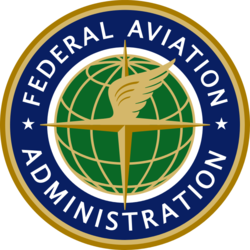Difference between revisions of "Federal Aviation Administration"
(Added: headquarters.) |
(pilot guns) |
||
| Line 5: | Line 5: | ||
|logo=US-FederalAviationAdmin-Seal.svg | |logo=US-FederalAviationAdmin-Seal.svg | ||
|description=The FAA regulates and oversees all aspects of American civil aviation. | |description=The FAA regulates and oversees all aspects of American civil aviation. | ||
| − | |headquarters=800 Independence Avenue | + | |headquarters=800 Independence Avenue, Washington, DC |
}} | }} | ||
| + | ==9/11== | ||
| + | In July 2001, the FAA rescinded a 40-year-old rule that permitted commercial airline pilots to be armed. The new rules required airlines to apply to the agency for their pilots to carry guns in cockpits and for the airlines to put pilots through an agency-approved firearms training course. WND reports that "throughout the life of the rule not a single U.S. air carrier took advantage of it, effectively rendering it “moot,” according to one agency official."<ref>http://www.wnd.com/2002/05/13933/</ref> | ||
==Regulatory Capture== | ==Regulatory Capture== | ||
Revision as of 01:51, 10 November 2015
 | |
| Formation | August 23, 1958 |
| Parent organization | US/Department/Transportation |
| Headquarters | 800 Independence Avenue, Washington, DC |
| Interest of | Rodney Stich |
| Exposed by | Bogdan Dzakovic |
| The FAA regulates and oversees all aspects of American civil aviation. | |
9/11
In July 2001, the FAA rescinded a 40-year-old rule that permitted commercial airline pilots to be armed. The new rules required airlines to apply to the agency for their pilots to carry guns in cockpits and for the airlines to put pilots through an agency-approved firearms training course. WND reports that "throughout the life of the rule not a single U.S. air carrier took advantage of it, effectively rendering it “moot,” according to one agency official."[1]
Regulatory Capture
The FAA is been cited as an example of regulatory capture, "in which the airline industry openly dictates to its regulators its governing rules, arranging for not only beneficial regulation but placing key people to head these regulators."[2] Retired NASA Office of Inspector General Senior Special Agent Joseph Gutheinz, who formerly was a Special Agent with both the U.S. Department of Transportation Office of Inspector General and FAA Security, is one of the most outspoken critics of FAA. Rather than commend the agency for proposing a 10.2 million dollar fine against Southwest Airlines for its failure to conduct mandatory inspections in 2008, he was quoted as saying the following in an Associated Press story: "Penalties against airlines that violate FAA directives should be stiffer. At $25,000 per violation, (which is how the 10.2 million dollar figure was reached) Gutheinz said, airlines can justify rolling the dice and taking the chance on getting caught. He also said the FAA is often too quick to bend to pressure from airlines and pilots."[3]
On July 22, 2008, in the aftermath of the Southwest Airlines inspection scandal, a bill was unanimously approved in the House that was supposed to tighten regulations concerning airplane maintenance procedures while slowing the revolving door. It established a whistleblower office and set a two-year "cooling off" period that FAA inspectors or supervisors of inspectors must wait before they can work for those they regulated.[4][5] The bill also required rotation of principal maintenance inspectors and stipulated that the word "customer" properly applies to the flying public, not those entities regulated by the FAA.[4] The bill died in a Senate committee that year.[6]
In September 2009, the FAA administrator issued a directive mandating that the agency use the term "customers" only to refer to the flying public.[7]
Plane ownership
Daniel Hopsicker notes the FAA has a track record of failure to charge owners of aircraft involved in very large scale drug busts such as the 2006 Mexico DC-9 drug bust. Hopsicker remarks that "the FAA system for registering airplanes is little-changed from when it was started back in the good ol boy days of the 1930's. Each plane has a paper folder, for example, stuffed with all correspondence regarding airworthiness and ownership relating to that plane. Its an antiquated system which some feel is kept deliberately in place to encourage a certain ambiguity when a plane is interdicted. When a change of registration is mailed in, the FAA places a plane's folder in what they call 'suspense'. That's a tremendous inducement to anyone with a chance of having a plane nabbed to keep floating sales in progress. The CIA, for example, is very adept at keeping files on its planes 'in suspense.'"[8]
This might account for the remarkable flurries of change of (supposedly) ownership just before planes are involved in a major drug bust - the suspicion being that they may be carried out retroactively.
Employees on Wikispooks
| Employee | Job | Appointed | End | Description |
|---|---|---|---|---|
| Ali Bahrami | Manager of the Transport Airplane Directorate. | 2004 | 2013 | |
| Ali Bahrami | Associate Administrator for Aviation Safety | 10 July 2017 | June 2021 | Pushed an agenda of "abdication" to Boeing during his leadership of the office regulating the company, including the Boeing 737 MAX. |
References
- ↑ http://www.wnd.com/2002/05/13933/
- ↑ Steven M. Davidoff, "The Government’s Elite and Regulatory Capture" New York Times (June 11, 2010). Retrieved April 11, 2011
- ↑ David Koenig, "Southwest Airlines faces $10.2 million fine" Mail Tribune, Associated Press (March 6, 2008). Retrieved April 11, 2011
- ↑ a b Paul Lowe, "Bill proposes distance between airlines and FAA regulators" AINonline.com (September 1, 2008). Retrieved April 11, 2011
- ↑ Library of Congress, Thomas Official Website Bill Summary & Status 110th Congress (2007 - 2008) H.R.6493
- ↑ Library of Congress, Thomas Official Website Bill Summary & Status 110th Congress (2007 - 2008) S.3440
- ↑ "FAA will stop calling airlines 'customers'" Reuters, USA Today (September 18, 2009). Retrieved October 17, 2009
- ↑ http://www.madcowprod.com/10092007.html